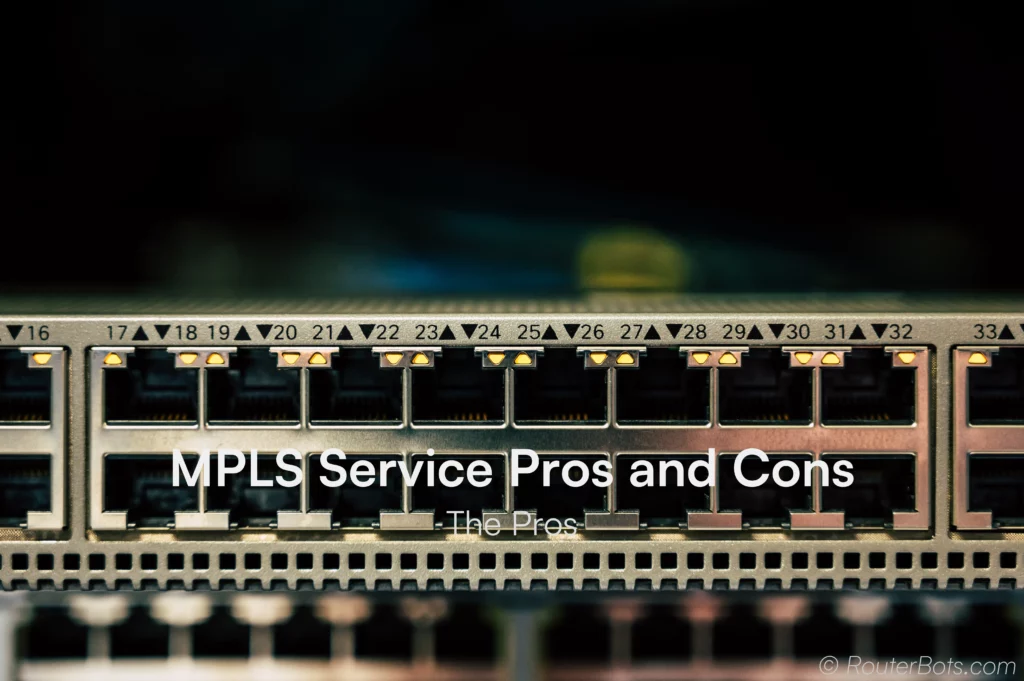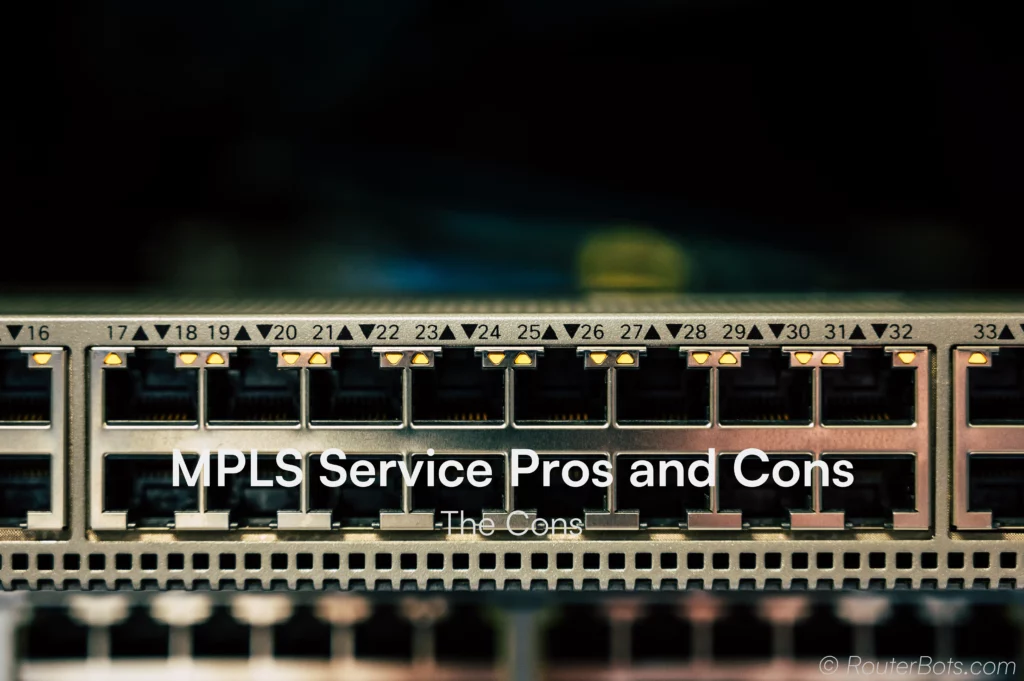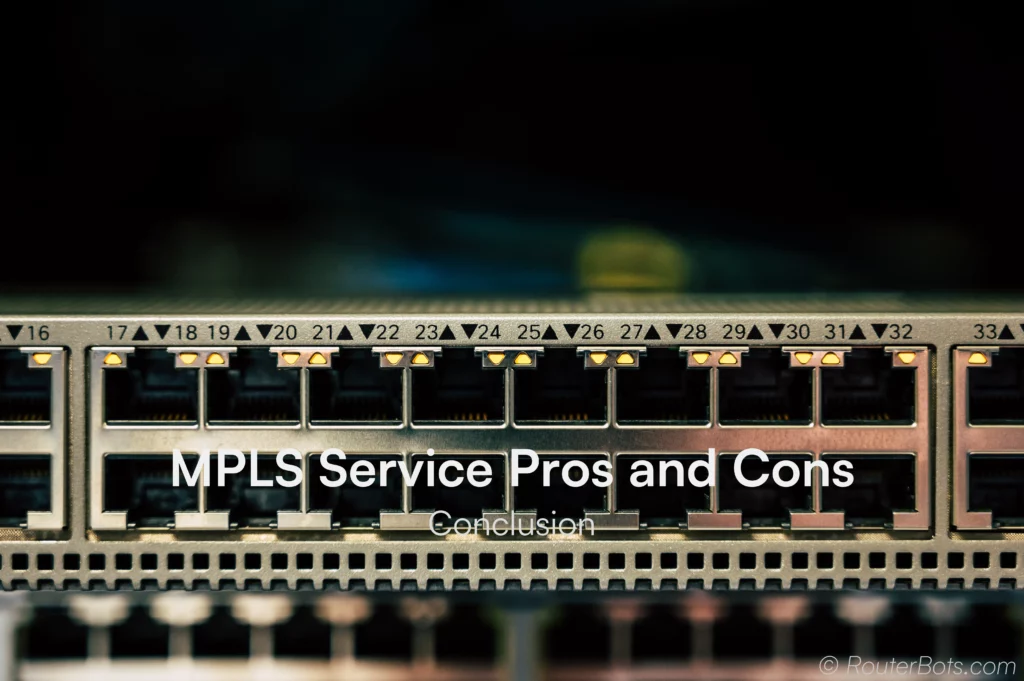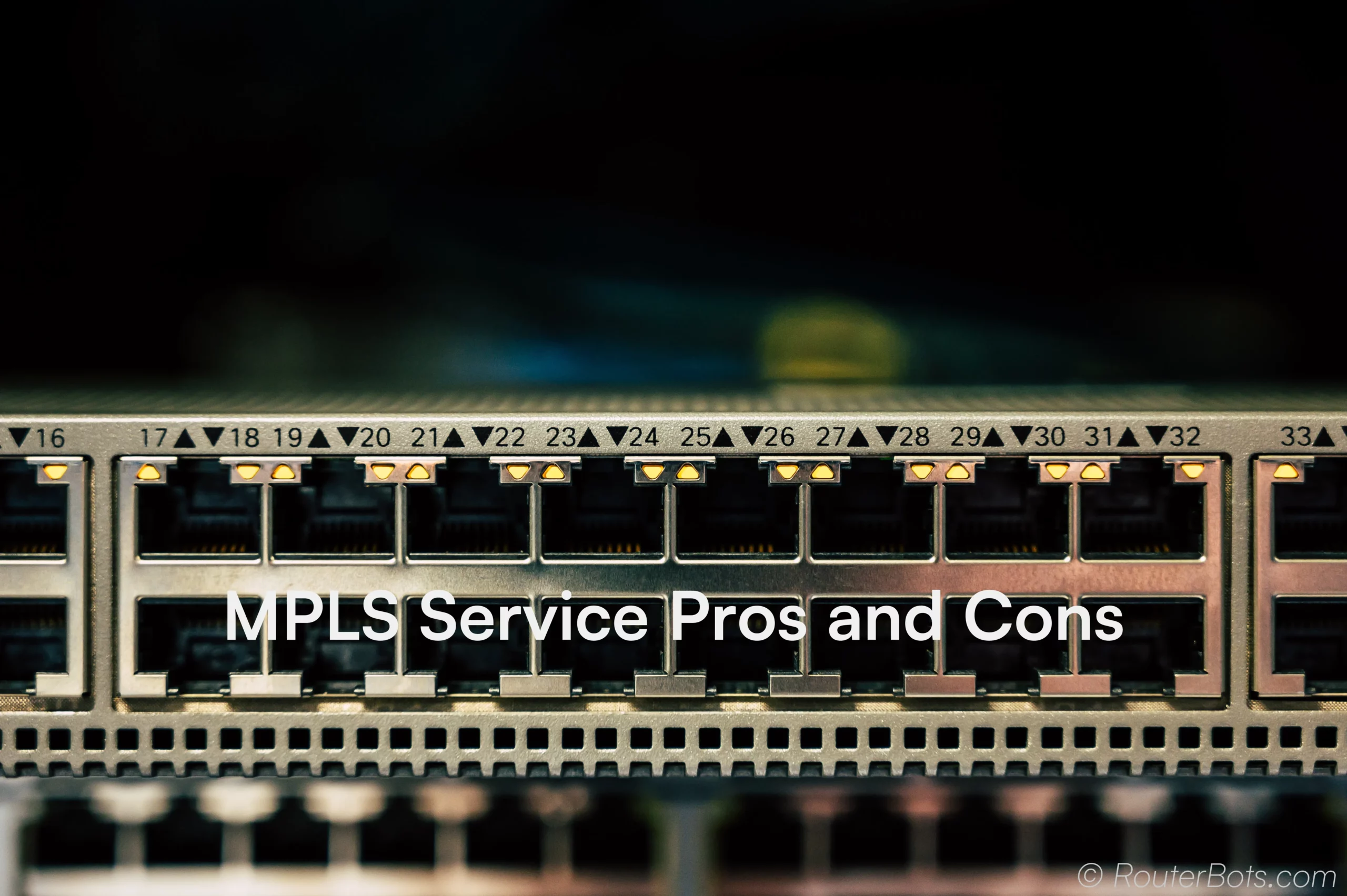If you are asking yourself what are the advantages and disadvantages of an MPLS Service, we have the answer for you in this post!
Introduction
It’s important to understand that MPLS is a technology that can be used on many different Platforms and Products. But in this article, we don’t focus on the technology itself, but on the MPLS service that various carriers & service providers offer. These services are targeted at business customers to provide a private & dedicated WAN network for said customers.

MPLS Service Pros
Service Level Agreement and guaranteed performance
Service Level Agreements (SLAs) are commonly used in the networking industry to guarantee a certain level of performance and availability for network services. In the case of MPLS services, SLAs are typically used to ensure that the service is able to deliver the required Quality of Service (QoS) for different types of traffic.
One of the main advantages of MPLS services is the ability to prioritize different types of traffic based on their importance to the business. For example, voice and video traffic can be given higher priority than data traffic to ensure that these services are delivered with minimal delay and jitter. This is achieved using MPLS traffic engineering, which enables network engineers to configure the network to ensure that traffic is routed along the most optimal path to avoid congestion and ensure the required QoS.
This MPLS traffic engineering is done by the service provider, so the customer of the MPLS Service has just to make sure that the traffic is correctly tagged (DSCP Value set).
To ensure that the MPLS network is able to deliver the required QoS, network service providers typically offer SLAs that guarantee certain levels of performance and availability. These SLAs may include metrics such as network uptime, packet loss, latency, and jitter, and specify penalties if the network fails to meet the agreed-upon service levels. SLAs may also specify the level of support and response times for resolving any network issues that arise.
Guaranteed performance is another important aspect of SLAs in MPLS networks. By offering guaranteed performance, service providers can provide a higher level of assurance to their customers that their services will be delivered with minimal disruption or degradation. This is particularly important for businesses that rely heavily on their network infrastructure to conduct day-to-day operations.
In addition to SLAs, network service providers may also offer service level guarantees (SLGs), which are designed to provide an even higher level of assurance to customers. SLGs may include more stringent performance metrics and higher penalties for failing to meet the agreed-upon service levels.
In conclusion, Service Level Agreements and guaranteed performance are critical aspects of MPLS networks. By offering SLAs and SLGs, network service providers can ensure that their customers receive the required level of performance and availability for their network services. As such, businesses that rely heavily on their network infrastructure should carefully consider the SLAs and SLGs offered by their service provider when selecting an MPLS network solution.
Greater security and privacy for network traffic
One of the benefits of using an MPLS service is the greater security and privacy it offers for network traffic. With MPLS, traffic is separated into different VPNs or virtual private networks, which creates a level of privacy and security that is not possible with traditional internet connections. This means that sensitive company data and information can be securely transmitted over the network without the risk of interception or exposure to outside parties. Additionally, MPLS providers often offer service level agreements (SLAs) that guarantee performance and uptime, which can be important for businesses that rely heavily on their network infrastructure. Overall, MPLS services offer a secure and reliable way to transmit data across a network, making it a popular choice for businesses with strict security and privacy requirements.
Scalability and flexibility in network design
Scalability and flexibility are key factors in any network design, and MPLS provides both of these benefits to businesses. With MPLS, it’s easy to connect additional sites to an existing service, making it a highly scalable solution. Adding a new location to an MPLS network is typically a matter of provisioning a new router or switch and configuring it to connect to the existing network. This is a much simpler process than building a completely new network from scratch. Additionally, MPLS provides flexibility in network design, allowing businesses to customize their network to fit their specific needs. For example, with MPLS, it’s possible to create private connections between specific locations within the network, providing an additional layer of security and privacy. This level of customization and flexibility is not always possible with other networking technologies, making MPLS a highly desirable option for businesses looking to build a robust and scalable network infrastructure.

MPLS Service Cons
High cost compared to alternative solutions
One of the main disadvantages of MPLS is the high cost compared to alternative solutions. MPLS services are typically more expensive than other WAN technologies such as broadband or Internet VPNs. This is due to the fact that MPLS requires dedicated hardware and infrastructure to ensure reliable and secure connectivity, and the cost of this equipment is often passed on to the customer. Additionally, MPLS providers often charge for additional services such as Quality of Service (QoS) and Service Level Agreements (SLAs), which can further increase costs. As a result, organizations with budget constraints may need to carefully evaluate the costs and benefits of MPLS before deciding whether it is the right solution for their networking needs.
Limited availability in some regions
One major disadvantage of MPLS is that it may not be widely available in all regions. While many service providers offer MPLS services, there are still areas where the infrastructure is not in place to support it. This can be a significant issue for businesses that need reliable and high-performance networking solutions in these areas. In some cases, alternative solutions like broadband or SD-WAN may be the only viable option. Additionally, the limited availability of MPLS may also result in higher costs for businesses that need to establish a connection in a region where MPLS is not readily available, as they may need to rely on more expensive backup or failover solutions.

Conclusion
In summary, MPLS has its advantages and disadvantages as a networking solution. On the positive side, MPLS offers guaranteed performance with SLAs, greater security and privacy for network traffic, scalability and flexibility in network design, and ease of connecting additional sites to an existing service. However, there are also some drawbacks, including high cost compared to alternative solutions and limited availability in some regions.
When considering MPLS as a networking solution, it is important to weigh these pros and cons against the specific needs and requirements of your organization. For businesses that require guaranteed performance and security for their mission-critical applications, MPLS may be the right choice. However, for organizations with less demanding network needs or smaller budgets, alternative solutions like broadband or SD-WAN may be more suitable.
Looking to the future, it is clear that MPLS will continue to play a significant role in the networking industry. While newer technologies like SD-WAN and segment routing are gaining traction, MPLS still offers unique advantages for certain use cases. As such, we expect to see continued investment and innovation in MPLS services and solutions, ensuring that it remains a relevant and valuable networking option for years to come.

Leave a Reply